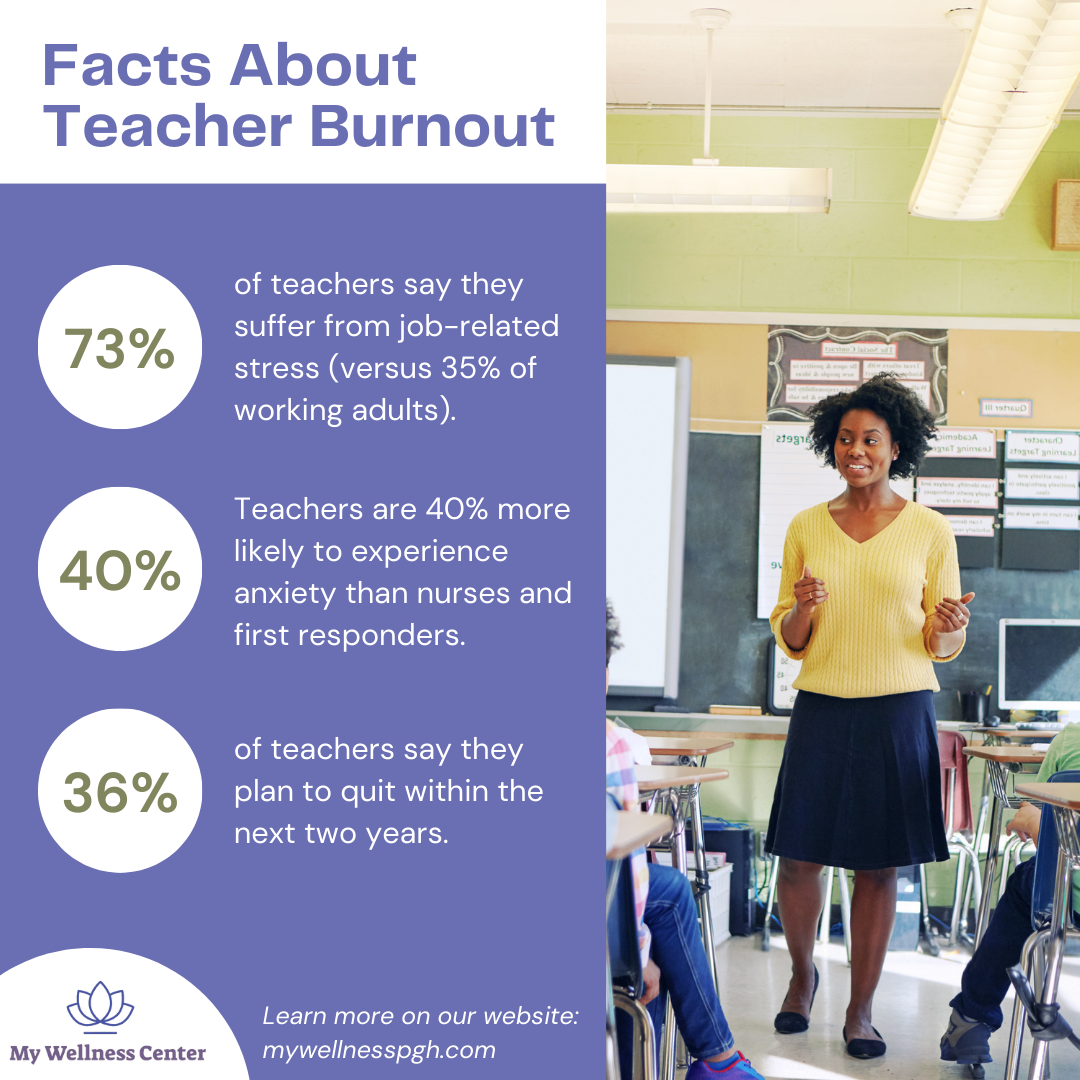There’s a reason we often recommend therapy for teachers: It’s a tough job. Teacher burnout is a national crisis, and school districts are struggling to find meaningful, long-term solutions.
Believe it or not, teachers face higher levels of anxiety than many other anxiety-inducing professions, according to the American Educational Research Association. In fact, teachers are:
- 40% more likely to experience symptoms of anxiety than healthcare workers, including nurses and first responders.
- 30% more likely to experience symptoms of anxiety than professionals in farming and the military.
- 20% more likely to experience symptoms of anxiety than office workers.
While therapy can help overcome anxiety and other symptoms of burnout, it’s helpful to understand where these mental health struggles stem from.

Table of Contents
What Are Some of the Most Common Causes of Teacher Burnout?
How to Overcome Teacher Burnout
Therapy for Teacher Burnout
What Are Some of the Most Common Causes of Teacher Burnout?
Our society relies on good teachers, but these professionals face challenges from all directions. Here are some of the most common causes of teacher burnout, based on multiple studies and our own interactions with classroom professionals:
1. Heavy Workloads
The public perception of teachers is often misaligned with reality. Although a typical school day may run from 9:00 to 3:00, teachers regularly work much more than that.
Between lesson planning, after-school activities, and continuing education, teachers are often out of the house for 12 hours a day.
And “summer vacation” is rarely a summer vacation. These months are commonly dedicated to developing new skills, optimizing lesson plans, and collecting resources for the year ahead.
Between multiple stressors from multiple directions, 73% of teachers say they suffer from job-related stress—compared to only 35% of working adults.
2. Low Salaries
Teachers in the U.S. feel wildly unpaid. In fact, 66% of teachers say their base salary is inadequate, according to research from the RAND Corporation. Compare that to 39% of working adults who feel underpaid.
And teachers don’t feel underpaid by a little. On average, teachers want a 27% pay increase to feel like their salary is “adequate.”
But it’s not just their baseline salary under scrutiny. Teachers often feel stuck in place, as switching schools or districts often results in a salary cut or, even worse, a hit to their pension.
3. Safety Issues
School shootings are on the rise. Between 2008 and 2024, annual school shootings quadrupled, according to CNN. These headline-grabbing tragedies worry teachers across the country, and they’ve also sparked school shooting trainings.
Although the intention behind these trainings is to prepare students, teachers, and faculty on what to do in the event of a mass shooting, they often cause as much harm as good.
We’ve heard teachers remark:
- They’re expected to act as human shields for the children in the event of a shooting, but they’re often not provided with other basic necessities to care for their students throughout the year.
- The training sessions are often conducted without clarity on whether or not the threat is real or simulated, placing teachers in nerve-wracking scenarios.
School shootings aren’t the only problem, however. Other concerns:
- 46% of schools have seen an increase in fighting and violence in recent years.
- Teachers are regularly threatened by upset parents who promise physical harm or to “ruin” the teacher’s professional career.
4. Staff Shortages
All over the world, schools struggle to hire educators. Research shows:
- 86% of public schools struggle to attract new teachers.
- The US has 36,500 open teacher vacancies.
- 51,000 teachers quit their jobs in 2023.
- 36% of teachers plan to quit in the next two years.
These shortages hurt everyone. Students don’t get enough attention. Parents grow frustrated with student performance. And the teachers are left to battle multiple problems because the schools are unable to hire additional support.
5. Lack of Balance
Teachers often feel a stressful lack of work-life balance that seeps into their overall happiness.
As we mentioned earlier, many teachers feel “stuck” inside contracts that tie them to a single job post—or leave at the risk of losing part of their retirement plan or suffering a pay cut.
On top of that, society rarely acknowledges the grueling hours that go into the job outside of typical school hours.
Just as bad: This time away from home makes it difficult for both male and female teachers to start a family. Teaching often demands 10-12 hours away from home during the day, which is precious time spent away from family and their own children’s developmental needs.
6. Vicarious Trauma
Teachers experience plenty of their own frustrations and traumas, but they may also suffer from vicarious trauma—empathetic pain from witnessing student struggles.
We often hear from teachers worried about students who come to school dirty, hungry, bruised, and wearing the same clothes for multiple days in a row.
While teachers can and should report instances of abuse, they’re often powerless to create meaningful change in their students’ personal lives.
How to Overcome Teacher Burnout
One of the best strategies to overcome teacher burnout is to attend therapy. And right now is better than ever; summer is the perfect time for teachers to focus on their mental health!
Some of the most valuable strategies we explore with teachers include:
1. Emotional Regulation
Emotional regulation is a powerful skill for teachers because it allows them to understand and control their emotions in the moment—whether it be during a student-teacher conflict in front of the classroom or in a difficult parent-teacher conference.
During our sessions, we help teachers:
- understand emotional regulation
- understand their feelings
- build emotional resilience
- plan reactions to specific emotions felt in the workplace
- and more!
2. Acceptance and Commitment Therapy (ACT)
ACT is the mindful practice of focusing on the present. Instead of focusing on problems or emotions, patients focus on developing solutions.
In the classroom, ACT can help teachers deal with their most common anxiety-inducing stressors, including parents pushing back against curriculum, school budget cuts, and new rules.
3. Practice Self-Care
Self-care isn’t selfish—it’s essential, especially for teachers. When your job revolves around pouring your energy into others, it’s easy to lose track of your own needs. We regularly work with educators to help them rediscover the activities, routines, and boundaries that support their emotional and physical wellbeing.
That might look like carving out 30 quiet minutes in the evening, finally using your sick days when you’re sick, or even setting stronger boundaries with students, parents, or administration. It might mean reconnecting with hobbies you used to love—reading, gardening, painting, or simply being outside.
Self-care also includes your physical health. Prioritizing sleep, eating nourishing foods, and moving your body regularly can play a massive role in your resilience, energy levels, and overall mental health.
4. Take Action
One of the most empowering steps a teacher can take is to identify what’s within their control—and act on it. That might mean speaking up about unsafe conditions, advocating for curriculum changes, or getting involved with your union or school board. Even small actions can begin to chip away at feelings of helplessness and disillusionment.
For some teachers, taking action means having tough conversations with supervisors or seeking a transfer to a school or district that aligns better with their values. For others, it means planning a long-term exit strategy from education altogether.
Therapy can help you map out a realistic, value-aligned plan—whether it’s staying and setting better boundaries or leaving the profession with clarity and confidence.
Therapy for Teacher Burnout
To find therapy for teachers, contact us at My Wellness Center! Our experienced, compassionate therapists are here to support you in your professional journey. Work with any of our therapists:

